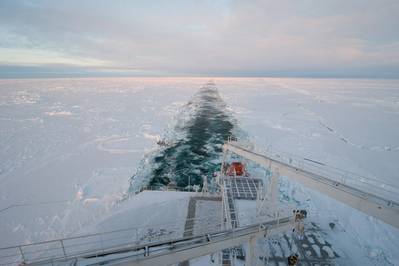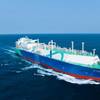Russia Designing Nuclear-powered Submarines to Transport Gas from the Arctic
Russia has begun designing nuclear-powered submarines to export liquefied natural gas (LNG) from the Arctic to Asia to try to nearly halve the journey time along the Northern Sea Route (NSR), a senior state official has said.
Russia already uses nuclear-powered ice breakers to pave the way for such transport via the NSR, which runs along Russia's Arctic shores from Murmansk in the west to the Bering Strait in the east, a route Moscow sees as a faster alternative to the Suez Canal and has plans to develop.
But Russia is suffering from a shortage of vessels able to battle thick Arctic ice, an obstacle for its new Arctic LNG 2 project which has been sanctioned by the United States over Moscow's war in Ukraine.
The Arctic LNG 2 facility started production of sea-borne LNG last December. But although the first cargoes with the super cooled gas were shipped in early August, it has yet to be passed on to the end-buyers.
Mikhail Kovalchuk, a close associate of President Vladimir Putin and director of the Kurchatov Institute, Russia's leading nuclear research facility, presented the submarine project at an industry conference in St. Petersburg last week, according to the event's official website.
"This is about the creation of a fundamentally new class of vessel capable of becoming an alternative to 'traditional' gas carriers, which in Arctic conditions are unable to navigate all year-round without icebreaker escort," the Offshore Marintec Russia 2024 website said.
It cited Kovalchuk, who held talks in the Kremlin with Putin on Sept. 24, as telling the conference: "The creation of underwater nuclear-powered gas carriers has been discussed for a long time, since the early 2000s. Now we (the Kurchatov Institute) and Gazprom have started designing one, and this work will move forward."
The RBC news outlet said the idea was to cut the time it takes to navigate the NSR from 20 days to 12 and said the submarines would be able to carry around 180,000 tons of LNG, in line with a conventional Arc 7 ice class gas carrier.
The planned submarines would be 360 metres long and no more than 70 metres wide, it said, and would be powered by RITM-200 nuclear reactors, which Russia uses to power its newest icebreakers.
Some experts are sceptical though about the feasibility of the submarine project.
Alexander Nikitin, a former Russian Navy officer who is a nuclear expert at the Vilnius-based Bellona Environmental Transparency Center, said Russia lacked the capabilities to build such a submarine.
And additional servicing vessels and docks as well as crews with special training would be needed too, he said.
"My opinion is that people think, 'Maybe it'll work.' But given the situation, it's unlikely," he said, calling the project "a bluff".
(Reuters - Reporting by Vladimir Soldatkin and Gleb Stolyarov; Editing by Andrew Osborn and Angus MacSwan)















